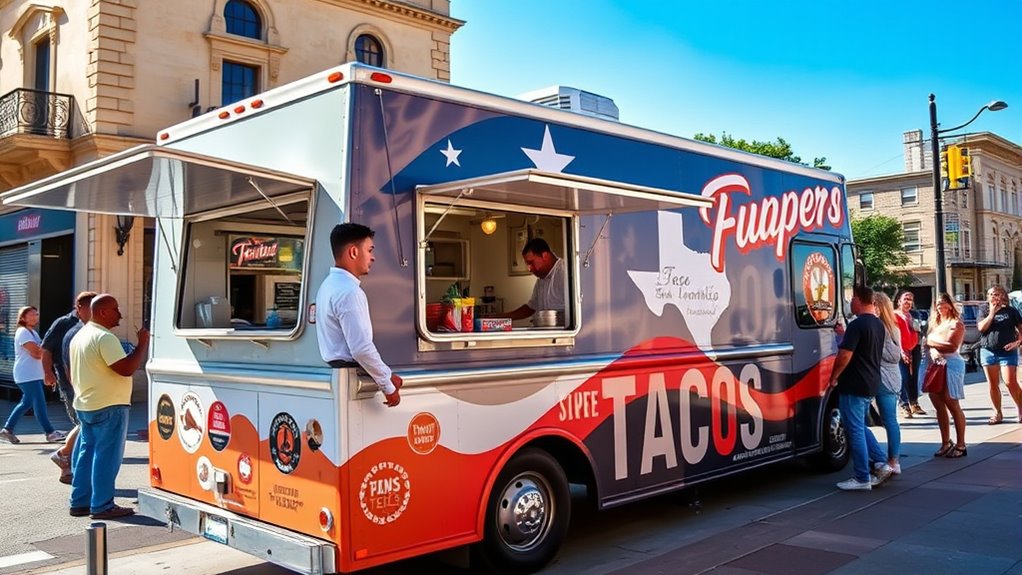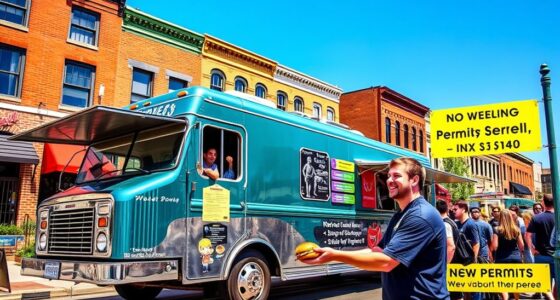To start a food truck in San Antonio, you’ll need permits like a Mobile Food Establishment Permit, along with food safety certifications, and a business license. Expect costs between $20,000 and $175,000 plus ongoing fees for permits, insurance, and marketing. You must find suitable locations away from no-vending zones and comply with zoning rules. Proper menu planning, safety checks, and marketing strategies like social media can boost your success. Continue to explore these steps for a smooth launch.
Key Takeaways
- Obtain necessary permits including a Mobile Food Establishment Permit, business license, and special downtown vending permits, ensuring compliance with health and zoning rules.
- Anticipate startup costs between $20,000 and $175,000, covering vehicle, equipment, licensing, insurance, and marketing expenses.
- Choose locations outside no-vending zones, secure private property permissions, and get approval for park and downtown vending spots.
- Maintain food safety standards through proper handling, sanitation, and regular inspections, designing menus suitable for truck preparation.
- Promote your food truck via social media, local events, loyalty programs, and GPS apps to increase visibility and customer engagement.
Navigating Permits and Legal Requirements in San Antonio
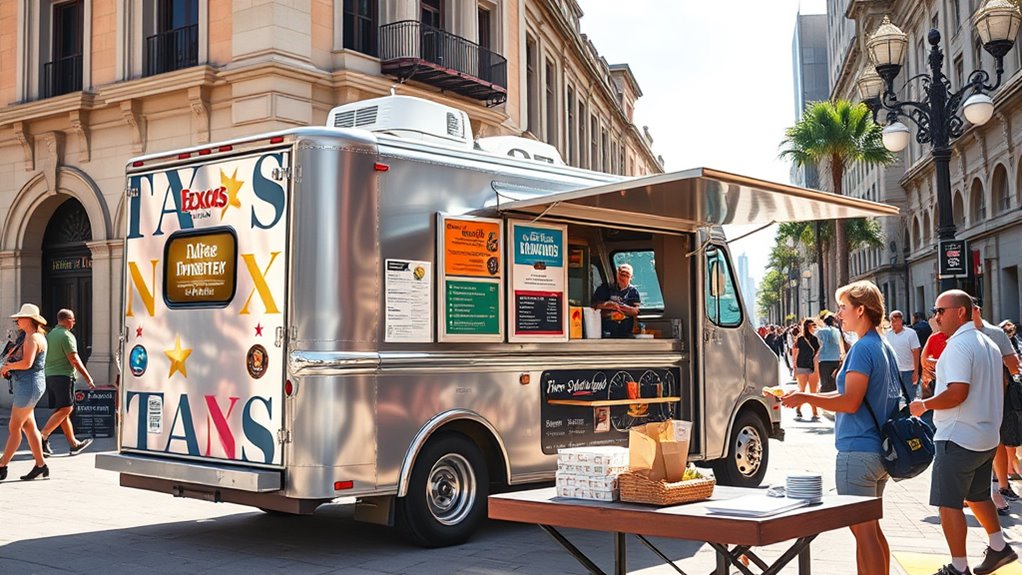
Managing permits and legal requirements in San Antonio is essential for any food truck owner to operate legally and avoid fines. You need to obtain a Mobile Food Establishment Permit from the San Antonio Metropolitan Health District (SAMHD). Your application must include proof of food handler’s certification and commissary kitchen use, which is mandatory for food prep, storage, and waste disposal. Passing a health inspection is required to demonstrate compliance with food safety standards, and the permit must be displayed on your truck during operation. Additionally, you need a business license from the city, with fees varying based on your vehicle and food types. For downtown vending, a specific permit and supporting documents are necessary. Be aware of zoning rules, parking restrictions, and possible background checks if you sell certain items. It’s also important to stay updated on vending regulations that may change periodically.
Understanding Costs and Fees for Food Truck Operations
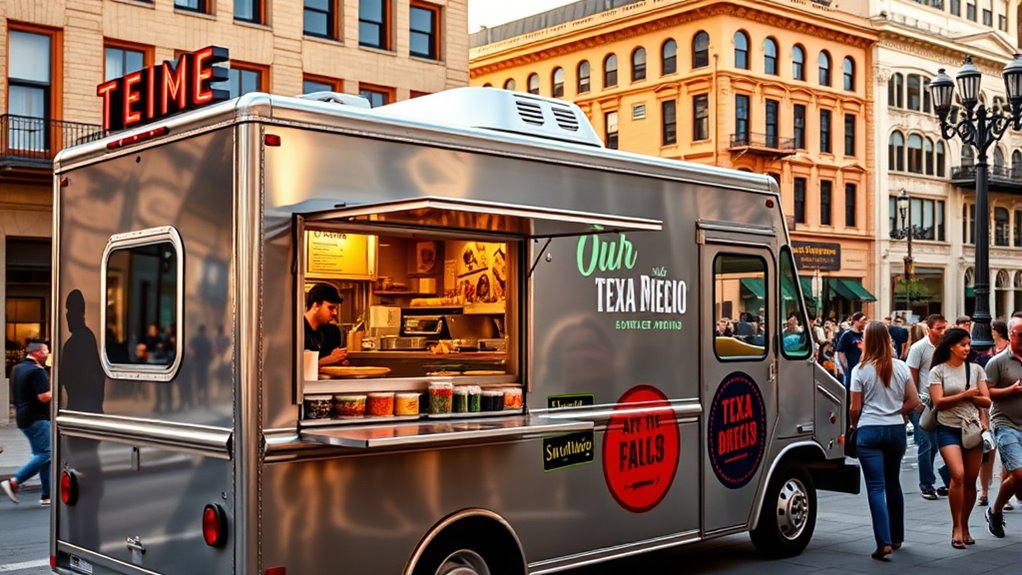
Understanding the costs and fees involved in food truck operations is crucial for planning your budget and ensuring profitability. You’ll need to consider three main areas.
Knowing the costs involved helps plan your food truck business effectively.
- Initial Investment: New trucks range from $50,000 to $175,000, with used options around $20,000 to $40,000. Leasing reduces upfront costs to about $2,000–$3,000 monthly, while trailers start near $35,000 plus a tow vehicle. Kitchen equipment and inventory add $2,000–$4,500 for startup supplies.
- Licensing and Permits: Expect fees between $450 and $1,350, plus additional costs for health, fire, and business licenses, often totaling $200–$1,000. Some cities may charge extra or require commissary kitchen use.
- Operating Expenses: Insurance costs range from $1,800 to $3,600 annually. Fuel averages $500–$1,000 monthly, with maintenance adding several hundred dollars. Marketing budgets typically fall between $2,700 and $7,200 annually.
Finding Optimal Locations and Navigating Zoning Restrictions
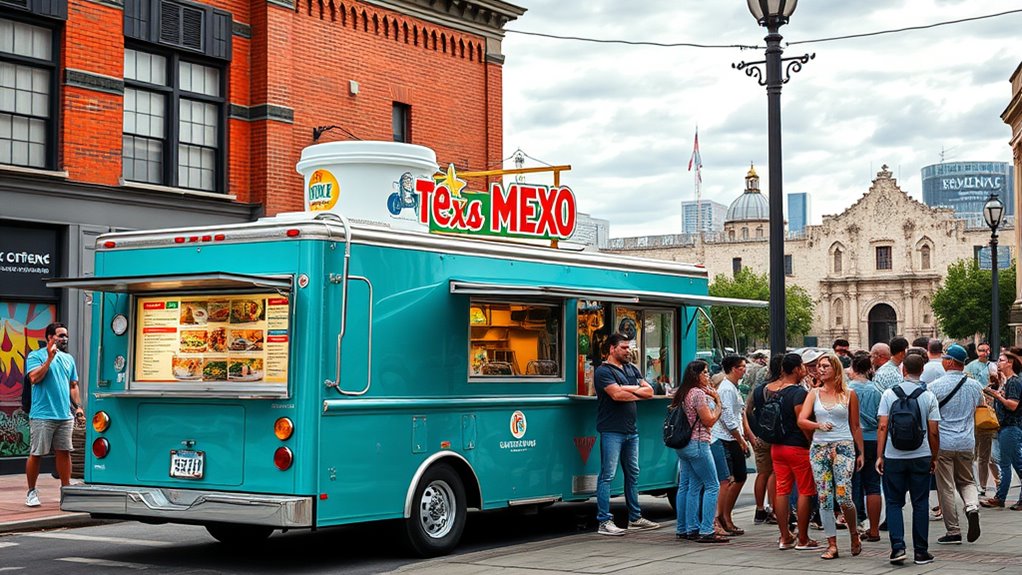
Finding the right locations for your food truck in San Antonio requires careful navigation of zoning rules and restrictions. You must avoid the 300-foot no-vending zones around restaurants, schools, and parks, which limit available spots. Parking on private property needs written, notarized permission from owners, and trucks must move daily. Operating within city parks requires departmental approval. Understanding zoning regulations and staying compliant is essential for long-term success.
Ensuring Food Safety, Menu Planning, and Inspection Protocols
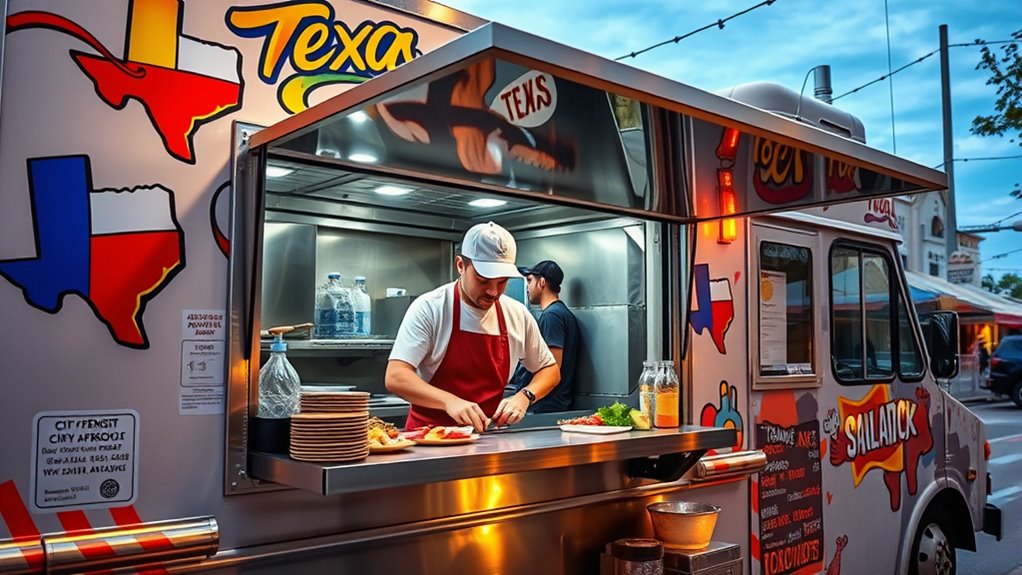
Ensuring food safety, menu planning, and inspection compliance is indispensable for operating a successful food truck in San Antonio. You must handle all food within the vehicle, keeping surfaces smooth, cleanable, and non-absorbent. Managing fresh and wastewater tanks carefully, monitoring chlorine levels, and maintaining sanitation logs are critical. For menu planning, choose items that can be prepared and served entirely inside the truck, minimizing cross-contamination and refrigeration needs. Use compliant appliances with proper ventilation and guarantee cold storage meets safety standards. Inspection protocols involve annual checks by the Fire Marshal, bi-weekly health visits, and maintaining fire safety equipment like extinguishers. Properly secured propane tanks, electrical wiring, and waste disposal practices are essential to passing inspections and running a safe, compliant operation. Fire sprinkler systems activate automatically to contain fires and protect both the vehicle and nearby structures. Regular maintenance of appliances and safety systems can help prevent energy inefficiency and ensure smooth operation.
Effective Marketing Strategies to Grow Your Food Truck Business
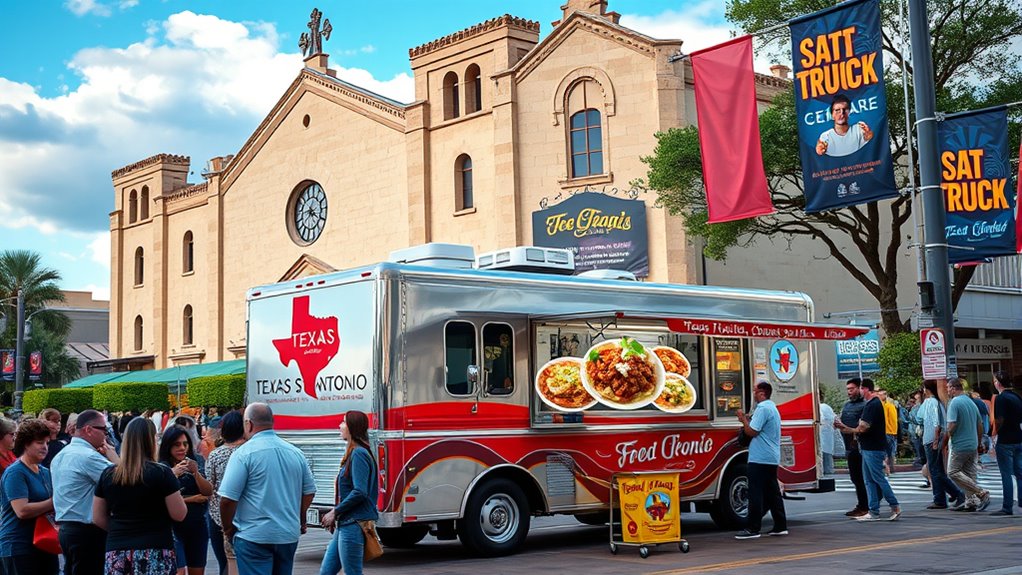
To successfully grow your food truck business in San Antonio, adopting effective marketing strategies is essential. Using social media is a powerful way to boost visibility; 68% of food trucks rely on platforms like Facebook, which 75% of operators use regularly. Social campaigns can increase sales by 20% and customer spending by 15%. Participating in festivals and local events (attended by 80% of trucks) drives immediate foot traffic and boosts brand recognition. Implementing loyalty and email programs (used by over 50% of trucks) encourages repeat visits and builds community. Leveraging mobile apps and GPS tracking makes it easier for customers to find you, while data analytics can improve your marketing ROI by 25%. Industry data indicates that integrating social sharing rewards into loyalty programs can boost social media reach by 50%, and combining these strategies keeps your truck competitive and thriving in San Antonio’s bustling food scene. Additionally, understanding the diverse dog names popular among local pet owners can help you connect with your community and foster customer loyalty.
Frequently Asked Questions
How Long Does the Entire Permitting Process Typically Take in San Antonio?
The entire permitting process in San Antonio usually takes between 2 to 4 weeks. You’ll need to submit your application, pass health and fire inspections, and wait for approval. Scheduling inspections may cause delays, especially if additional documentation is needed. Coordinating with multiple departments like Health, Fire, and Police can extend the timeline. Stay proactive, guarantee all requirements are complete, and you’ll streamline your journey to start your business.
Are There Specific Zones or Areas Where Food Trucks Are Restricted During Certain Hours?
Restrictions roam across San Antonio’s streets, so you need to know where and when you can vend. Food trucks face fines and failures if they operate in designated downtown districts without permits or in school zones during school hours. Zones like the Downtown Business District and school areas have strict hours, often banning vending during mornings, afternoons, or special events. Planning your routes around these rules keeps your food truck freely flowing.
What Are the Best Practices for Maintaining Sanitation Logs and Water Quality Records?
You should keep detailed sanitation logs and water quality records to stay compliant. Record daily cleaning activities, sanitizer levels, water source info, and water temperatures, including responsible staff and dates. Use standardized checklists and store logs in an organized system for quick access during inspections. Regularly review and train your team on proper documentation, ensuring all records are accurate, complete, and retained for the required period to demonstrate compliance.
How Can New Vendors Effectively Build a Loyal Customer Base in San Antonio?
Building a loyal customer base in San Antonio starts with creating a memorable experience. Use digital tools and QR codes for easy sign-ups and rewards, making customers feel appreciated. Attend local events, collaborate with nearby businesses, and pick busy spots to boost visibility. Offer unique menu items, seasonal specials, and engage with the community. Consistently share updates on social media, and reward repeat visits with discounts or freebies, turning new visitors into loyal fans.
Are There Any Upcoming City Regulations or Amendments Affecting Food Truck Operations?
You should stay informed about upcoming city regulations affecting food truck operations. San Antonio’s current rules include a mandatory Mobile Food Establishment Permit, zoning restrictions, and regular health inspections. The new statewide health permit bill, effective July 1, 2026, will streamline licensing, reducing costs and administrative burdens. Additionally, be aware of local compliance requirements like commissary use, vending hours, and background checks, ensuring you operate legally and smoothly.
Conclusion
Starting your food truck journey is like steering a ship through busy waters—you’ll navigate permits, costs, and locations, but with a steady hand and clear direction, you’ll reach success. Keep your menu sharp and safety in check, like a well-maintained compass guiding your way. With smart marketing as your lighthouse, you’ll attract loyal customers and chart a course toward a thriving business. Stay focused, adaptable, and confident—you’re the captain of this tasty adventure.
